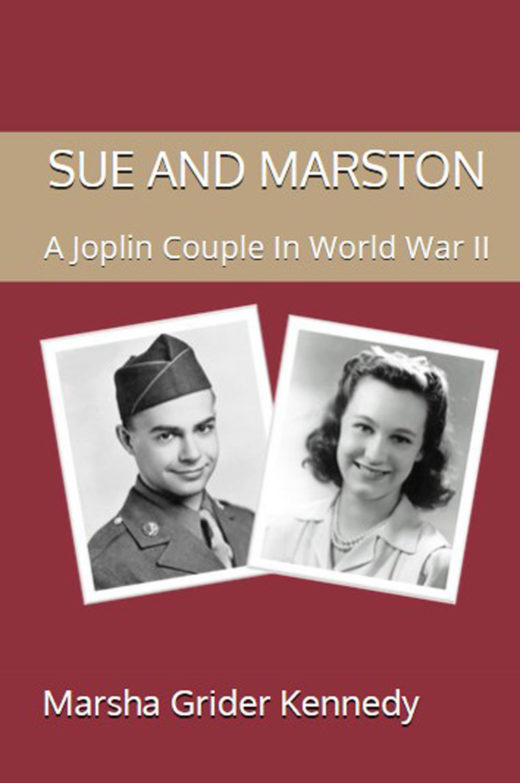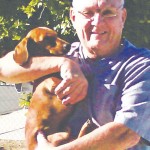History is something we all learn in school. We read books, watch movies and we are taught about world events that occurred before our time.
Then, there is our personal history — the stories that are told within our families of where we came from and what we can expect to be passed down in our DNA.
What we don’t hear much — the combination of both, world events and personal history.
There were hundreds of everyday families who lived their lives during the historic 1940s. World War II was in full swing, and while we heard about the soldiers on the front lines, you rarely heard about those helping support those on the front lines.

Marsha Kennedy has been working on changing that. Her parents were young and in the prime of their lives. They documented it well with writings, mementos and photographs that were kept in the family all these years.
Kennedy decided to write a book, “Sue and Marston: A Joplin Couple in World War II,” putting all of those personal pieces of history in one place for herself, her family and those interested in what everyday America was like for some during those times.
“The book is a glimpse into my parents’ world of the 1940s, which is vastly different from ours,” Kennedy said. “They represent the millions of Americans who quietly did their part to support those who risked their lives on the front lines and to support the efforts of the Allied Forces around the world to preserve our freedoms.”
Kennedy’s parents were teenagers when World War II started and lived in Joplin, Missouri.
Her father, Leslie Marston Grider, was taken into the Ordnance Corp (then the Ordnance Department) of the U.S. Army, fixing vehicles and other machinery to keep those on the front lines safe. Grider spent most of his time in Paris, France during the war.
Her mother, Ursula “Sue” Adele Johnson, became a telephone operator working to keep the soldiers in contact with their families while they were overseas.
I asked Kennedy what she expects people to learn from this book.
“I think people will have a greater understanding of what the average person did,” she said. “For the fellows, it was someone not on the front lines in combat, but a very necessary back-up group that could keep the guys on the front lines supplied. My mom kept so many people connected. It’s a peek into some average American’s lives.”
Kennedy was able to sit down with her dad in recent years, talking and compiling information. Facts, photos and all the details that come with that were important for Kennedy. Wanting to keep as much information as accurate as possible while creating stories out of them.
“My dad loved photography,” said Kennedy. “My mom was a historian at heart because she documented and kept everything.”
Kennedy has been interested in history and genealogy since she was a teenager.
“It’s been a life-long pursuit, and I think it’s fascinating,” confessed Kennedy. “Looking into the past, it’s made me very grateful for what I have. The changes that have happened from the past until now have been so vast.”
Kennedy has been a part of the Genealogy Cafe at the Idyllwild Library that meets once a month (currently on hold due to COVID-19), giving her the opportunity to share and learn with the group.
Carrying down the family legacy of writing the stories of the previous generations, Kennedy has chosen to continue this tradition stating, “My grandfather composed poems when he was a young man. My father has written not only his own WWII story but wrote the life story of his parents and grandparents.”
Putting all of that information together allows that history you learn in a textbook to become humanized.
“My next goal is to write stories about the various couples I’ve found in my genealogy,” said Kennedy. “I’ve traced back to the 1600s, so far.”
It takes time to research history and genealogy. Kennedy has been working on it for over a year, but she had a big head start with her family’s information, making the process easier.
“If people are interested in it, I say just do it,” Kennedy said. “I think at the very least, the story I put together will be good for my grandchildren to have. They will know a little bit more about the generations before them.”
Kennedy’s mother passed away years ago. In an interesting twist, Kennedy learned first-hand how fleeting time is and how important it is to make the time when something is important to you.
Kennedy’s father was recently diagnosed with COVID-19.
She came home just hours before our phone interview after being with him. Grider passed away on Sunday morning at the age of 95, less than 24 hours after we spoke about her memories and treasures she holds so dear.
The book that carries her parents’ legacy into the future is now in loving memory of them both.
“Sue and Marston: A Joplin Couple in World War II” will be published by mid to late June.
“I want to donate some of the books to the historical society back in Joplin and to the Idyllwild Library for their genealogy section,” Kennedy said.
Talk to those generations that don’t willingly offer information for answers you seek. Our future is only as good as the history we learn.










